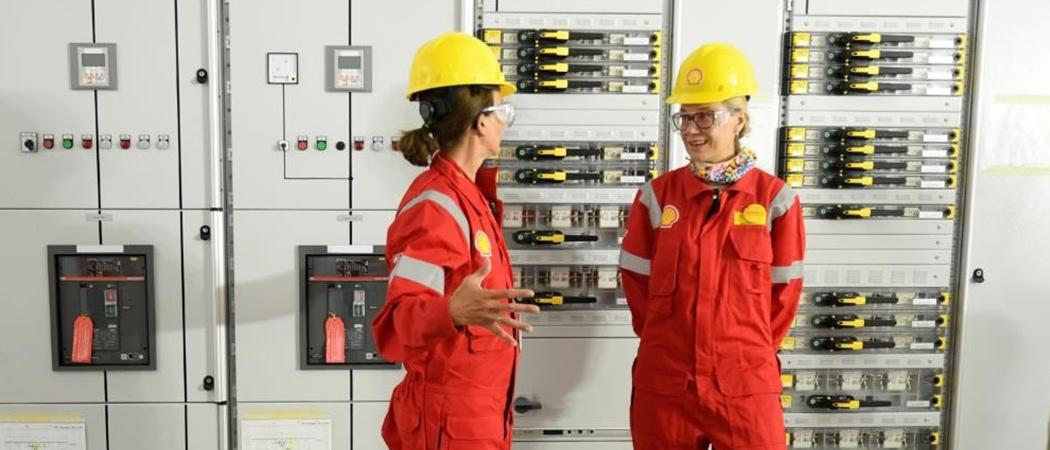What is claimed as the world’s biggest electrolyser for generating hydrogen from water using renewable energy and the greening of Brussels airport, are among 73 projects selected for funding

Elisabeth Brinton, Executive Vice President New Energies Shell (left) and Kadri Simson (right) talk during a visit at the
Refhyne Project (world’s largest PEM hydrogen electrolysis) in Wesseling, Germany. Photo : refhyne.eu
In a last hurrah for the 2014 – 2020 research programme Horizon 2020, the European Commission has announced how it will spend €1 billion on projects advancing the objectives of the EU Green Deal, in a show of climate ambitions ahead of the COP26 meeting in Glasgow next week.
A total of 73 projects will tackle issues such as climate adaptation, clean energy, circular economy, sustainable mobility, food system improvements and biodiversity.
In a telling example of how supply and demand are seriously out of kilter in European research funding, 1,550 proposals requesting over €16 billion were submitted to this final Horizon 2020 call. Fewer than 5% secured funding.
Details of the winning Green Deal projects come just days before world leaders kick off the COP26 climate conference in Glasgow and follows a number of other Green Deal-related announcements made by the Commission this week, including a €1.5 billion call for low carbon technology demonstrator projects to be funded by auctioning the EU’s CO2 emission allowances.
Among the projects are plans to install the world’s largest polymer electrolyte membrane electrolyser to produce green hydrogen in Cologne, Germany, which will help decarbonise refinery operations and demonstrate the potential of scaling up 100MW electrolysers. It will be a €147 million effort, partially financed by Horizon 2020.
Another project will lead the way towards low carbon airports by giving Brussels airport a green makeover. There are more than 30 actions in the plan, from deploying hydrogen-powered vehicles on the runways, to building a biofuel blending facility on airport grounds to produce sustainable aviation fuel. “Here, the ambition is to mix biofuel with kerosene and systemically increase the percentage of biofuel,” said the coordinator of the project, Arnaud Feist, who is CEO of Brussels Airport Company.
Confronting wildfires
To mitigate the effects of climate change, one of the projects FIRE-RES, will set up and work with 11 living labs to come up with ways to improve the management of extreme wildfire events, a growing problem all around Europe. “FIRE-RES will provide a new framework that encompasses technological, social, economic and ecological solutions that ultimately work towards […] enhancing forest restoration and adaptation,” said Andrea Duane, coordinator of the project, which will receive almost €20 million in funding.
There will be a similar €21 million climate change mitigation project in the restoration of freshwater ecosystems. The objective is to reduce flood and drought risks by analysing and looking for ways to improve 17 large-scale restoration projects, to define best practice and identify areas with high potential for freshwater restoration.
When it comes to food, the Commission is investing €12 million in a project to support sustainable procurement of school meal services. School catering accounts for a significant part of the food market in Europe, meaning improvements could have a significant impact. “We’re looking at it from a pretty broad picture in terms of trying to get this systemic change to happen,” said project coordinator Amalia Ochoa of the Basque Centre for Climate Change.
While funded under the last big Horizon Europe call in September 2020, the projects are expected to feed into both the five Horizon Europe missions and to the public-private partnerships. EU research commissioner Mariya Gabriel also wants to see the projects establish links with the Commission’s start-up fund, the European Innovation Council. “We could help some of the projects and companies grow and become European champions in this field,” she said.





 A unique international forum for public research organisations and companies to connect their external engagement with strategic interests around their R&D system.
A unique international forum for public research organisations and companies to connect their external engagement with strategic interests around their R&D system.